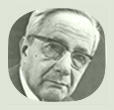
Michael Polanyi Hungary, 1891 - United States, 1976
Born in Budapest in a Jewish family that belonged other renowned intellectuals. He graduated first in medicine and served as a medic during World War II. He received his Ph.D. in Physical Chemistry at the University of Budapest in 1920 and immigrated to Germany where it was dedicated research in this discipline. In 1933 he is forced to leave Berlin and settled in Britain where you will play as a teacher in Manchester and Oxford. Gradually his interests shifted physicochemical epistemology, economics and political philosophy, and in 1948 became director of the area of social sciences at the University of Manchester. In the mid-1930s began to publish his epistemological works, which carries out a critique of the positivist view that proposes a model of state-led science. From his philosophical reflections, Polanyi developed a broad understanding of science, as a model that provides the basis for a remarkable range of human activities and for understanding fundamental aspects of the human situation. His analysis on the practice of scientific and tacit knowledge have influenced conceptions of Thomas Kuhn and Paul Feyerabend, as well as sociologists and historians of science.




